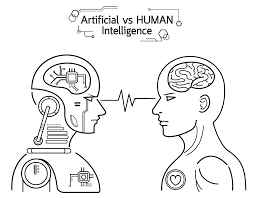Artificial Intelligence vs. Human Jobs: Can AI Take Over?
As technology advances, the question of whether or not artificial intelligence (AI) will replace human jobs has become increasingly relevant. In this article, we will explore the topic of AI and its impact on the workforce, discussing its potential to take over human jobs, its benefits and drawbacks, and what the future holds for this rapidly developing technology.
What is Artificial Intelligence?
AI refers to computer systems that can perform tasks that typically require human intelligence, such as learning, problem-solving, decision-making, and language understanding. AI systems can be categorized into three types: narrow or weak AI, general or strong AI, and super AI.
Narrow AI, also known as weak AI, is designed to perform specific tasks, such as speech recognition or image classification. General AI, also known as strong AI, has the ability to perform any intellectual task that a human can. Super AI, also known as artificial general intelligence (AGI), is hypothetical and refers to an AI system that has surpassed human intelligence in all domains.
Can AI Take Over Human Jobs?
The fear of AI replacing human jobs has been around for decades, but with recent advances in technology, it has become more plausible. While it is true that AI has the potential to automate many jobs, it is also true that it can create new ones. The impact of AI on the workforce will depend on the industry, the type of job, and the level of education required.
According to a report by the World Economic Forum, AI is expected to displace around 75 million jobs globally by 2022, but it will also create 133 million new jobs. The report suggests that jobs that involve repetitive tasks, such as data entry or assembly line work, are more likely to be automated, while jobs that require human skills, such as creativity, critical thinking, and emotional intelligence, are less likely to be replaced by AI.
Benefits and Drawbacks of AI
AI has numerous benefits, including increased efficiency, accuracy, and speed. It can also reduce costs and improve safety in hazardous environments. For example, AI can be used in healthcare to diagnose diseases, in finance to detect fraud, and in manufacturing to optimize production processes.
However, AI also has its drawbacks. One major concern is that it can perpetuate and amplify existing biases in society, as AI systems are only as unbiased as the data they are trained on. Another concern is that it may lead to widespread unemployment, particularly for low-skilled workers. Additionally, AI has the potential to be used for malicious purposes, such as cyber attacks or surveillance.
The Future of AI and Human Jobs
As AI technology continues to evolve, it is likely to have a significant impact on the job market. However, it is important to note that not all jobs will be replaced by AI, and new jobs will emerge as a result of AI adoption. It is crucial for individuals and organizations to adapt and upskill in response to these changes.
In conclusion, AI has the potential to take over some human jobs, but it is not a clear-cut issue. The impact of AI on the workforce will depend on the industry, the type of job, and the level of education required. While AI has numerous benefits, it also has its drawbacks, and it is essential to consider both when discussing its impact on the job market. As AI technology continues to evolve, it is important for individuals and organizations to adapt and embrace the changes that come with it.




No comments:
Post a Comment